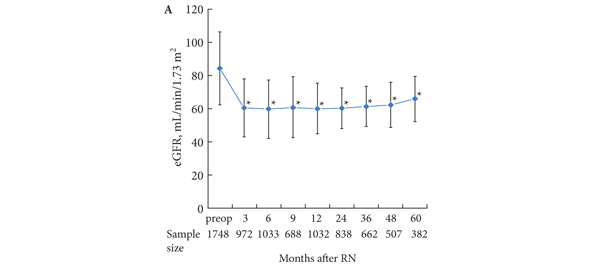Article of the week: Restored renal function after RN
Every week the Editor-in-Chief selects the Article of the Week from the current issue of BJUI. The abstract is reproduced below and you can click on the button to read the full article, which is freely available to all readers for at least 30 days from the time of this post.
In addition to the article itself, there is an accompanying editorial written by a prominent member of the urological community. This blog is intended to provoke comment and discussion and we invite you to use the comment tools at the bottom of each post to join the conversation.
Finally, the third post under the Article of the Week heading on the homepage will consist of additional material or media. This week we feature a video from Dr. Chung discussing his paper.
If you only have time to read one article this week, it should be this one
Trends in renal function after radical nephrectomy: a multicentre analysis
Jae S. Chung1, Nak H. Son2, Seok-Soo Byun6, Sang E. Lee6, Sung K. Hong6, Chang W. Jeong6, Sang C. Lee6, Dong-Wan Chae7, Won S. Choi8, Yong H. Park3, Sung H. Hong4, Yong J. Kim9 and Seok H. Kang5
1Department of Urology, Inje University College of Medicine, Haeundae Paik Hospital, Busan, 2Department of Biostatistics, Yonsei University College of Medicine, 3Department of Urology, Seoul National University Hospital, 4Department of Urology, Seoul St. Mary’s Hospital, 5Department of Urology, Korea University Anam Hospital, Seoul, 6Departments of Urology and 7Internal Medicine, Seoul National University Bundang Hospital, Seongnam, 8Choi Won Suk Urology Clinic, Yongin, and 9Department of Urology, Chungbuk National University Hospital, Cheongju, Korea
OBJECTIVE
• To evaluate serial changes in renal function by investigating various clinical factors after radical nephrectomy (RN).
PATIENTS AND METHODS
• The study population consisted of 2068 consecutive patients who were treated at multiple institutions by RN for renal cortical tumour without metastasis between 1999 and 2011.
• We measured the serial change in estimated glomerular filtration rate (eGFR) and clinical factors during a 60-month follow-up period.
• The changes in eGFR over time were analysed according to baseline eGFR (eGFR ≥60 and 15–59 mL/min/1.73m2) using a linear mixed model.
• The independent prognostic value of various clinical factors on the increase in eGFR was ascertained by multivariate mixed regression model.
RESULTS
• Overall, there was a subsequent restoration of renal function over the 60 months.
• The slope for the relationship between the eGFR and the time since RN was 0.082 (95% confidence interval [CI] 0.039–0.104; P < 0.001) and 0.053 (95% CI 0.006–0.100; P = 0.038) in each baseline group, indicating that each month after RN was associated with an increase in eGFR of 0.082 and 0.053 mL/min/1.73m2, respectively.
• When we analysed renal function based on various factors, postoperative eGFR of patients with diabetes mellitus, old age (≥70 years) or a preoperative eGFR of <30 mL/min/1.73 m2, was decreased or maintained at a certain level without any improvement in renal function.
• Preoperative predictors of an increase in eGFR after RN were young age, no DM, no hypertension, a preoperative eGFR of ≥30 mL/min/1.73m2 and time after surgery (≥36 months).
CONCLUSIONS
• Renal function recovered continuously during the 60-month follow-up period after RN.
• However, the trends in functional recovery change were different according to various clinical factors and such information should be discussed with patients when being counselled about their treatment for renal cell carcinoma (RCC).
Read Previous Articles of the Week

